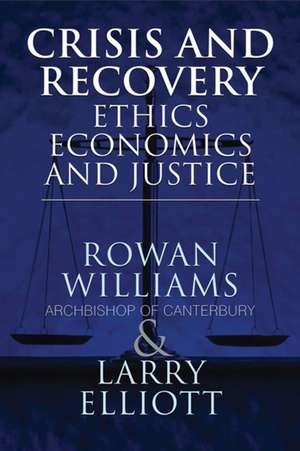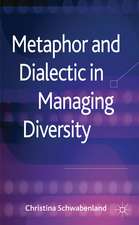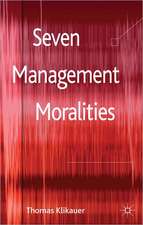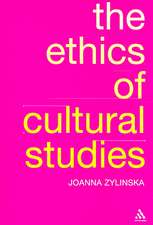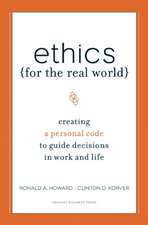Crisis and Recovery: Ethics, Economics and Justice
Autor Larry Elliott, Rowan Williams, Archbishop of Canterburyen Limba Engleză Hardback – 23 sep 2010
Preț: 390.63 lei
Nou
Puncte Express: 586
Preț estimativ în valută:
74.76€ • 81.17$ • 62.79£
74.76€ • 81.17$ • 62.79£
Carte tipărită la comandă
Livrare economică 22 aprilie-06 mai
Preluare comenzi: 021 569.72.76
Specificații
ISBN-13: 9780230252141
ISBN-10: 0230252141
Pagini: 200
Ilustrații: XIV, 200 p. 14 illus.
Dimensiuni: 155 x 235 x 20 mm
Greutate: 0.48 kg
Ediția:2010
Editura: Palgrave Macmillan UK
Colecția Palgrave Macmillan
Locul publicării:London, United Kingdom
ISBN-10: 0230252141
Pagini: 200
Ilustrații: XIV, 200 p. 14 illus.
Dimensiuni: 155 x 235 x 20 mm
Greutate: 0.48 kg
Ediția:2010
Editura: Palgrave Macmillan UK
Colecția Palgrave Macmillan
Locul publicării:London, United Kingdom
Cuprins
Foreword; Rowan Williams, Archbishop of Canterbury Introduction; Larry Elliott, Economics Editor, The Guardian Theology and the Nature of Accountability; Rowan Williams, Archbishop of Canterbury Investment and Public Policy in a Globalized Economy; Lord Robert Skidelsky Values in an Ethical UK Economy; Jon Cruddas MP with Jonathan Rutherford, Editor, Soundings Economics and the Shape of Society; Phillip Blond, ResPublica Ethics in a Service Economy; Adam Lent, Senior Policy Officer, TUC Investment Banking: The Inevitable Triumph of Incentives Over Ethics – John Reynolds Culture and the Crisis; Andrew Whittaker, FSA Marrying the Market with the Environment; Zac Goldsmith The Financial Crisis and the End of the Hunter Gatherer; Will Hutton, Executive Vice-Chair, The Work Foundation
Recenzii
The future of humankind in an interconnected and globalized world will be based on the notion of togetherness. This notion is at the base of any recovery and this book provides the principles for how this can be achieved.' - Klaus Schwab, Founder and Executive Chairman, World Economic Forum
'An excellent, very readable book for the layman that is immensely interesting and encouraging for anyone who has a nagging sense that the current economic crisis might also be a profound opportunity for change and the possibility of a fairer, more equal and eventually, longer-lasting planet.' - Richard Curtis, writer, director, and co-founder of Comic Relief
'Two of the most powerful forces in our world are religion and money. This book brings them together in ways that are both well-informed and ethically and politically sensitive. The result will be of interest to any religious or secular citizen concerned about the wise shaping of twenty-first century society.' - David F. Ford, Regius Professor of Divinity, University of Cambridge, and Director of the Cambridge Inter-Faith Programme
'Suddenly, theological and ethical approaches to economics are no longer marginal, but central to the most penetrating analyses of the current crisis. This book shows why. It also shows how thinkers from both left and right are converging on the view that we can only correct market injustice by establishing an ethical market that is more integrally related to cultural values, political purposes and environmental flourishing. Such a market, it is suggested, would be more egalitarian, and yet more genuinely free and less subject to cyclical instability than the one which we have at present. Everyone interested in a different global future should read these fine essays with care.' - John Milbank, Research Professor in Religion, Politics and Ethics and Director of the Centre of Theology and Philosophy, University of Nottingham
'Whether or not you follow any traditional faith, this interesting and illuminating collection will leave you healthily sceptical of faith-based economics.' - The Guardian
'The merit of Crisis and Recovery is that the essayists are drawn from a range of different backgrounds and standpoints, though they agree in commending a shift in social attitudes as the fundamental solution to today's economic woes.' - TLS
'Archbishop Williams has initiated a vital debate...' - Vista
'...the book creates its unique niche in drawing together voices from an array of perspectives to challenge the assumption that businesses are 'too big to fail' and too big to change.' - Movement
'An excellent, very readable book for the layman that is immensely interesting and encouraging for anyone who has a nagging sense that the current economic crisis might also be a profound opportunity for change and the possibility of a fairer, more equal and eventually, longer-lasting planet.' - Richard Curtis, writer, director, and co-founder of Comic Relief
'Two of the most powerful forces in our world are religion and money. This book brings them together in ways that are both well-informed and ethically and politically sensitive. The result will be of interest to any religious or secular citizen concerned about the wise shaping of twenty-first century society.' - David F. Ford, Regius Professor of Divinity, University of Cambridge, and Director of the Cambridge Inter-Faith Programme
'Suddenly, theological and ethical approaches to economics are no longer marginal, but central to the most penetrating analyses of the current crisis. This book shows why. It also shows how thinkers from both left and right are converging on the view that we can only correct market injustice by establishing an ethical market that is more integrally related to cultural values, political purposes and environmental flourishing. Such a market, it is suggested, would be more egalitarian, and yet more genuinely free and less subject to cyclical instability than the one which we have at present. Everyone interested in a different global future should read these fine essays with care.' - John Milbank, Research Professor in Religion, Politics and Ethics and Director of the Centre of Theology and Philosophy, University of Nottingham
'Whether or not you follow any traditional faith, this interesting and illuminating collection will leave you healthily sceptical of faith-based economics.' - The Guardian
'The merit of Crisis and Recovery is that the essayists are drawn from a range of different backgrounds and standpoints, though they agree in commending a shift in social attitudes as the fundamental solution to today's economic woes.' - TLS
'Archbishop Williams has initiated a vital debate...' - Vista
'...the book creates its unique niche in drawing together voices from an array of perspectives to challenge the assumption that businesses are 'too big to fail' and too big to change.' - Movement
Notă biografică
THE MOST REVEREND ROWAN WILLIAMS, ARCHBISHOP OF CANTERBURY is first and foremost the bishop in the diocese of Canterbury, but is acknowledged internationally as an outstanding theological writer, scholar and teacher. He has been involved in many theological, ecumenical and educational commissions. He has written extensively across a very wide range of related fields of professional study – philosophy, theology, spirituality and religious aesthetics. He has also written throughout his career on moral, ethical and social topics and, since becoming archbishop, has turned his attention increasingly on contemporary cultural and interfaith issues.
LARRY ELLIOTT has been at the Guardian since 1988 and is the paper's economics editor.
He is the co-author of three books with Dan Atkinson - the Age of Insecurity in 1998; Fantasy Island, in 2007, which warned that Britain's growth under New Labour was a debt-driven illusion; and The Gods That Failed in 2008, an analysis of the events and forces that brought the global financial system to the brink of collapse. His areas of speciality are the UK and global economy, trade and development. He was part of the group that put together the proposal for a Green New Deal, published by the New Economics Foundation in 2008. Larry is a visiting fellow at Hertfordshire University, a council member of the Overseas Development Institute and an adviser to the Catalyst thinktank and Red Pepper magazine.
LARRY ELLIOTT has been at the Guardian since 1988 and is the paper's economics editor.
He is the co-author of three books with Dan Atkinson - the Age of Insecurity in 1998; Fantasy Island, in 2007, which warned that Britain's growth under New Labour was a debt-driven illusion; and The Gods That Failed in 2008, an analysis of the events and forces that brought the global financial system to the brink of collapse. His areas of speciality are the UK and global economy, trade and development. He was part of the group that put together the proposal for a Green New Deal, published by the New Economics Foundation in 2008. Larry is a visiting fellow at Hertfordshire University, a council member of the Overseas Development Institute and an adviser to the Catalyst thinktank and Red Pepper magazine.
